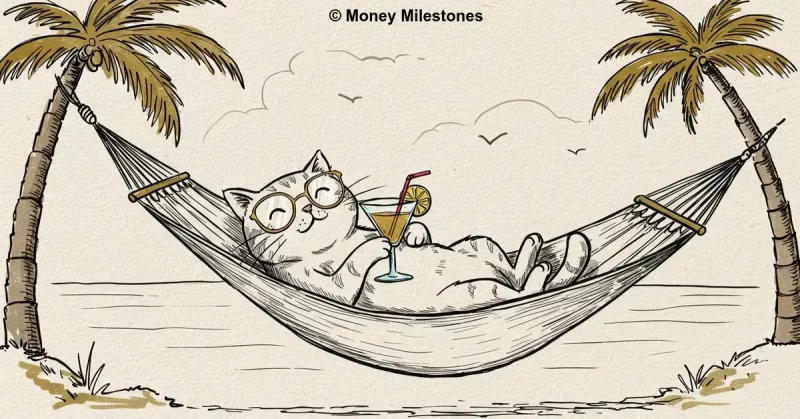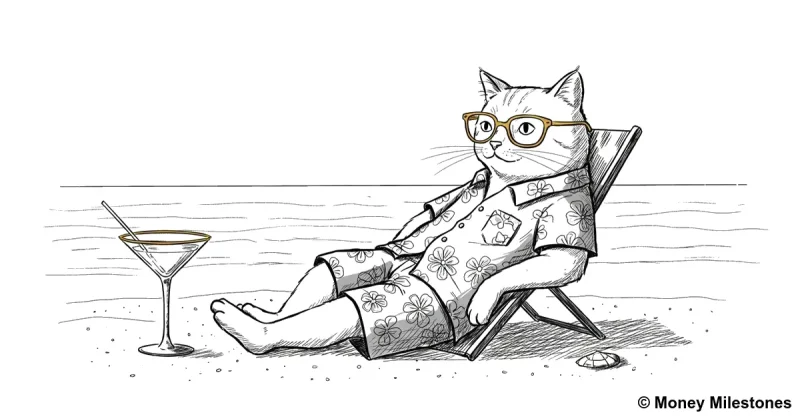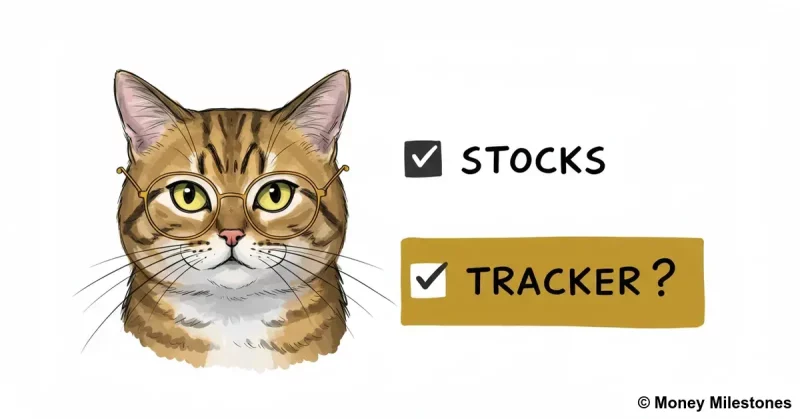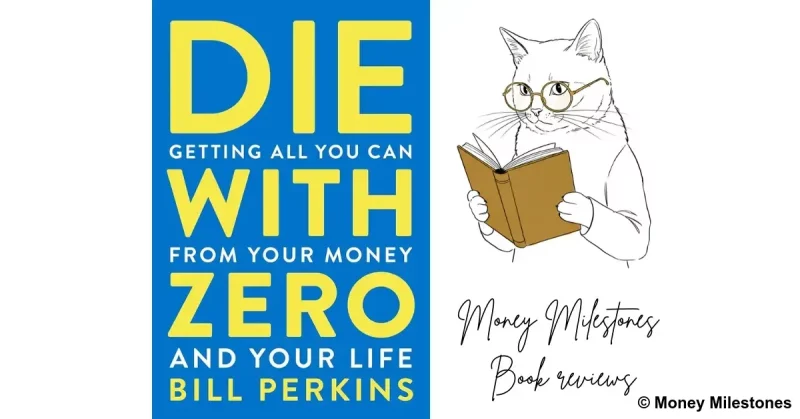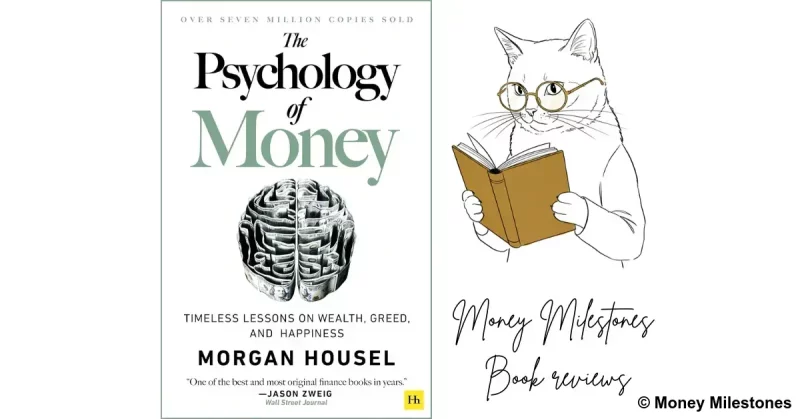How to retire early: A realistic guide to Financial Independence
Why you might want to retire early
It’s Monday morning. You’re in the office. It’s raining outside. Greg is already sending angry messages on Teams. Someone has stolen your favourite mug. Do I really have to do this for another 30 years? you wonder. The answer? Not necessarily. Here’s how you can retire early.
Understanding FIRE (Financial Independence, Retire Early)
You might have heard of a movement called FIRE (Financial Independence, Retire Early). It’s a financial lifestyle approach focused on aggressively saving and investing a large portion of your income to achieve early retirement and financial freedom.
This article takes inspiration from the FIRE movement, but my goal is to stay impartial and highlight both the benefits and potential hurdles. With that out of the way, let’s jump in!
How to retire early: The two key steps
If you want to retire early, there are two main things you need to do:
- Save as much as possible each month.
- Invest it to grow your money pot as quickly as possible.
Sounds simple, right? But as you’ll see below, there are a few twists and a couple of bumps in the road you’ll want to watch out for.
Step 1: Save as much as you can each month
This one is pretty straightforward. If you can stash away 50% of your salary each month, then for every month you work, you save enough to cover one month of retirement. And that’s before factoring in any investment returns. The higher your savings rate, the less time it will take to retire. Some FIRE enthusiasts even recommend setting aside 70–75% of your salary each month.
Now, it’s important to acknowledge that saving 50–75% of your salary every month is a lot. Let’s assume you earn the median UK salary, around £37,000. This equates to a net monthly income of roughly £2,500. Setting aside 75% of that would leave you with just £625 per month to cover everything: rent or mortgage, groceries, utilities, car expenses, phone bills, holidays, and more.
Things look a little better with a 50% savings rate. You’d have £1,250 per month to cover all your expenses. Depending on your personal circumstances, it might be doable, but it certainly won’t be easy.
Step 2: Invest your money to make it grow
Earning a high salary and saving a big chunk of it each month is only part of the equation for early retirement. You’ll also need to invest your hard-earned cash.
The reason is simple: by investing, you’ll (hopefully) earn extra money, which will, in turn, generate even more money, and so on. This process is called compounding, and the longer you stay invested, the more powerful its effect becomes.
The rate at which your investments grow is called the rate of return, and it has a huge impact on how quickly your money increases over time. Let me give you an example.
Let’s go back to the previous example. Imagine you earn £2,500 per month (after tax) and invest 50% of it every month. How long would it take to reach £500,000?
- 0% return (leaving your money in a current account) → 33 years and 4 months
- 4% return → 21 years and 5 months
- 10% return → Just over 15 years
So yeah, the rate of return matters immensely.
To get a clearer idea of your own path to early retirement, you can try out our early retirement calculator. You can estimate how long it will take to retire and how different factors, such as the growth rate, will affect your timeline.
One more thing. Before building your FIRE pot, make sure to pay off high-interest debt like credit cards or payday loans, as the interest usually outweighs investment returns. For support, contact the free and confidential National Debtline.
Hard truths about retiring early
Hard truth #1: High pay is key to retiring early
Technically, the two key factors that determine how soon you can retire are your savings rate and your investment returns. Whether you earn £1,000 or £10,000 per month, if you can save and invest 50% of it, each month you work effectively buys you one month of retirement, even before investment returns are factored in.
That being said, it’s pretty obvious that saving 50% on a £1,000 salary is far more challenging than on a £10,000 salary. And even with the same savings rate, there’s a huge difference between setting aside £5,000 per month versus £500 per month. The kind of retirement you can afford will be vastly different.
The truth is, if you really want to retire early, you’ll need to find a job that pays as much as possible. If you ever step into one of those fancy skyscrapers in the City of London, where some of the highest salaries in the country are paid, you’ll notice that few employees are over 50. Finding a high-paying job is the first step to retiring early.
As a side note, if you’re considering opting out of your workplace pension to boost your take-home pay and invest more each month, it’s almost certainly a bad idea. I covered this in more detail in an article I wrote a few weeks ago.
Hard truth #2: You can’t predict your rate of return
In my experience, this is one aspect that FIRE enthusiasts often overlook. While we can look at the average rate of return for an investment over a long period (say, 30 or 50 years) and assume it will remain roughly the same in the future, there’s no guarantee that this will actually happen.
In my opinion, there’s a good reason why the FIRE movement gained popularity in the USA during the 2010s. If you had invested in the S&P 500 (a widely followed US stock index) in January 2010 and withdrawn your money in January 2020, your average annual rate of return would have been over 11%.
That’s an extremely high rate of return. At that pace, you’d double your money in less than seven years. Pretty good, right? Except, in 2010, when you first invested, there was no way to know this would happen.
If, instead of investing in the S&P 500, you had chosen its UK counterpart, the FTSE 100, your average annual rate of return would have been just over 3%. In some cases, the rate of return could even be negative, meaning you would have actually lost money.
Just to be clear, I’m not against investing. There’s a reason why so many people do it: with some knowledge and a bit of luck, you can achieve returns that wouldn’t be possible otherwise. But keep in mind that investing is inherently risky, and you could lose some or even all of your money, as explained in this article where I compare saving and investing. If that happens, retiring early will become much more difficult.
There’s always an element of luck in investing, but the more you learn, the less likely you are to make a bad investment.
A balanced approach to retiring early
I hope you enjoyed this crash course on the FIRE approach! In a nutshell, here’s what you need if you want to retire early:
- A high salary
- A high savings rate: most FIRE experts recommend saving at least 50% of your salary each month
- A solid investment plan
- Plenty of time to let compounding do its thing
- A bit of luck!
Keep in mind that even if you follow an investment plan devised by Warren Buffett himself, there’s no guarantee you’ll get a good rate of return, or even a positive one!
So, my final piece of advice: plan for the future, and do everything you can to retire early if that’s your goal, but don’t sacrifice the present for a future that may never happen. If you absolutely hate your job, don’t stay just because you might be able to retire in 15 years.
The same goes for savings. If setting aside 50% of your salary makes you miserable because you can’t afford to see friends, go on holiday, or enjoy the things you love, is it really worth it? I’ll let you be the judge of that.
If you’d like to explore the topic further, take a look at my article on the different FIRE pathways. In any case, thank you for reading until the end! Stay tuned for more articles on personal finance.

